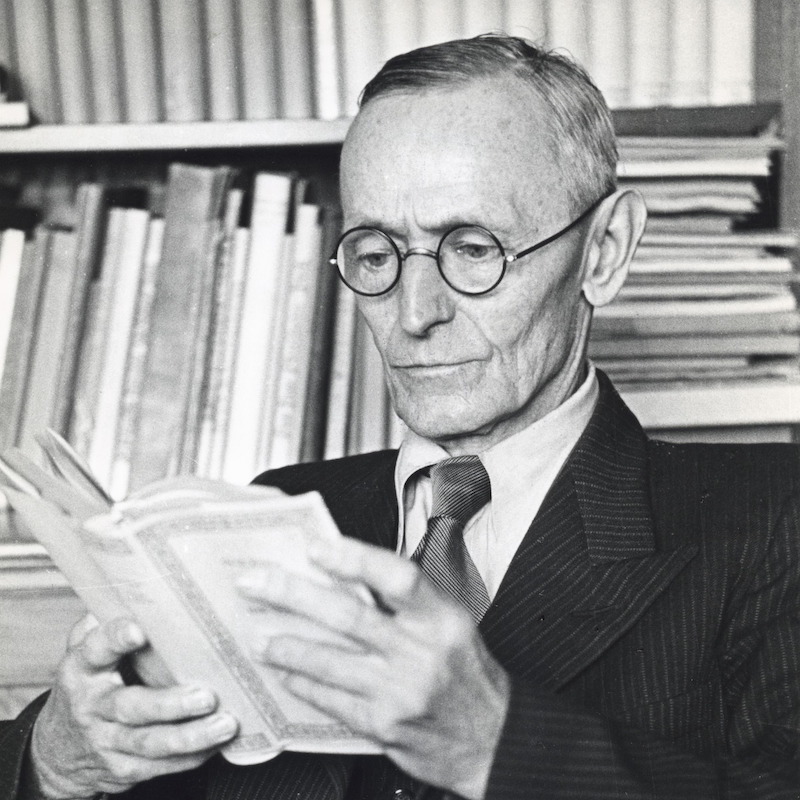Siddhartha (1922)
Episode #3 of the course Masterpieces of world literature and why they matter by Alisa Miller
Welcome to Day 3 of Masterpieces of World Literature. Yesterday, we took a strange trip through an unusual transformation, and today’s book will take us on an individual journey to find meaning in life. We will be learning about Siddhartha, written by Hermann Hesse.
The Search for Enlightenment
Siddhartha tells the tale of a young man in ancient India born to a Brahmin, who is a priest and teacher of the Hindu religion. Siddhartha along with his friend, Govinda, leave their family homes in search of enlightenment. Siddhartha and Govinda first try to find enlightenment by living an ascetic life. This simple way of living doesn’t bring them what they want.
Next, they seek out the Buddha, whom they heard was traveling nearby with his disciples. After listening to the teachings of the Buddha, Govinda decides to become a disciple, but Siddhartha does not. Siddhartha believes the teachings of the Buddha will not lead him to enlightenment.
Siddhartha wanders and comes to a river. The ferryman takes Siddhartha across the river and tells him they will meet again. Siddhartha walks to a village, where he begins the next phase of his life. Here, Siddhartha eventually becomes a wealthy merchant. For many years, he lives a life of the senses filled with wealth, sex, food, and wine. Eventually, Siddhartha realizes this lifestyle has not lead him to enlightenment either, and leaves the village.
Siddhartha comes upon the river he once crossed, where he sleeps. When he wakes, a monk is watching over him. Siddhartha recognizes the monk as his old friend, Govinda. The two talk and Govinda eventually moves on. Inspired by his talk with Govinda, Siddhartha seeks out the ferryman, where he remains for many years, working alongside the ferryman. During this time, Siddhartha learns about the spiritual world from both the ferryman and the river.
Eventually, the ferryman leaves Siddhartha to be responsible for the ferry himself, and this is the moment that Siddhartha achieves enlightenment. Many years later, Govinda seeks out a wise ferryman he has heard about and finds his old friend, Siddhartha. During their meeting, Govinda also achieves enlightenment.
Finding Balance
The story of Siddhartha speaks to its readers through the shared connection of experiences. Many people search for how to live a fulfilling life. Like Siddhartha, some seek the path of simplicity, some seek spirituality, and some seek earthly desires. What Siddhartha teaches its readers is that any one of those paths isn’t likely to be the correct one, but instead, a life filled with a balance of all these things is more apt to provide peace and substance.
Bringing Meaning to Life
Hermann Hesse was born in southern Germany to Pietist missionaries. His grandparents and mother spent decades working in India prior to Hesse’s birth, and Indian culture featured prominently in his upbringing. It is no surprise that Hesse chose to set his story of the individual’s search for meaning in India with the backdrop of Hinduism. In preparation for writing Siddhartha, Hesse studied German translations of the Bhagavad Gita, the Upanishads, and the Buddha’s speeches.
Hesse began writing Siddhartha in 1919, but in 1920, he struggled to finish the novel. In 1921, Hesse underwent psychoanalysis with Carl Jung for several weeks. Hesse credited this experience with breaking through his writer’s block, and he finished the novel in 1922.
In 1919, when Hesse first began writing Siddhartha, Germany was recovering from World War I. It is not surprising to know that Siddhartha’s popularity peaked again internationally just after World War II and in America during the Vietnam War. The turmoil of war sends its survivors on a search for peace and meaning in their lives, and the story of Siddhartha offers some hope of finding what they seek.
Today, Siddhartha still enjoys popularity around the world. Young and old alike relate to Siddhartha’s desire to find himself, and welcome the promise of doing so through the words of Hermann Hesse.
Now that you have learned how to find inner peace through Hesse’s novel, tomorrow, we will examine a book either praised as a masterpiece or cursed as nonsense: James Joyce’s Finnegans Wake.
Recommended book
Siddhartha by Hermann Hesse (or free ebook version)
Share with friends

